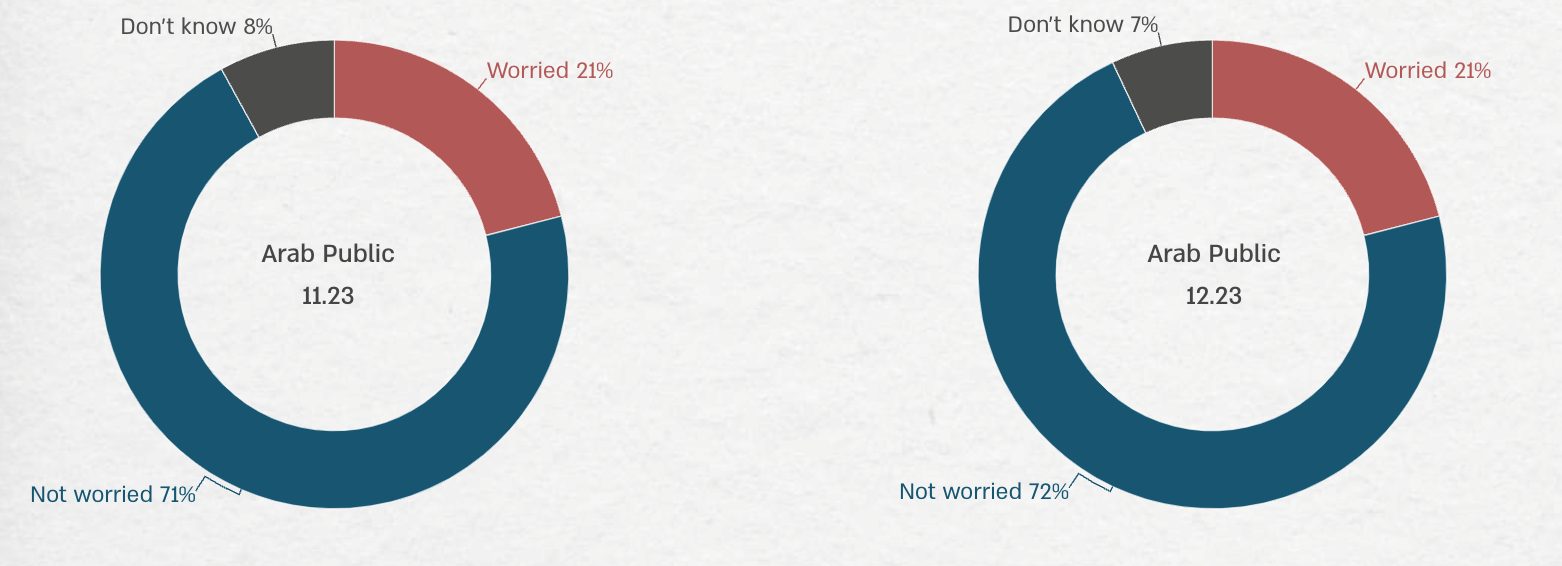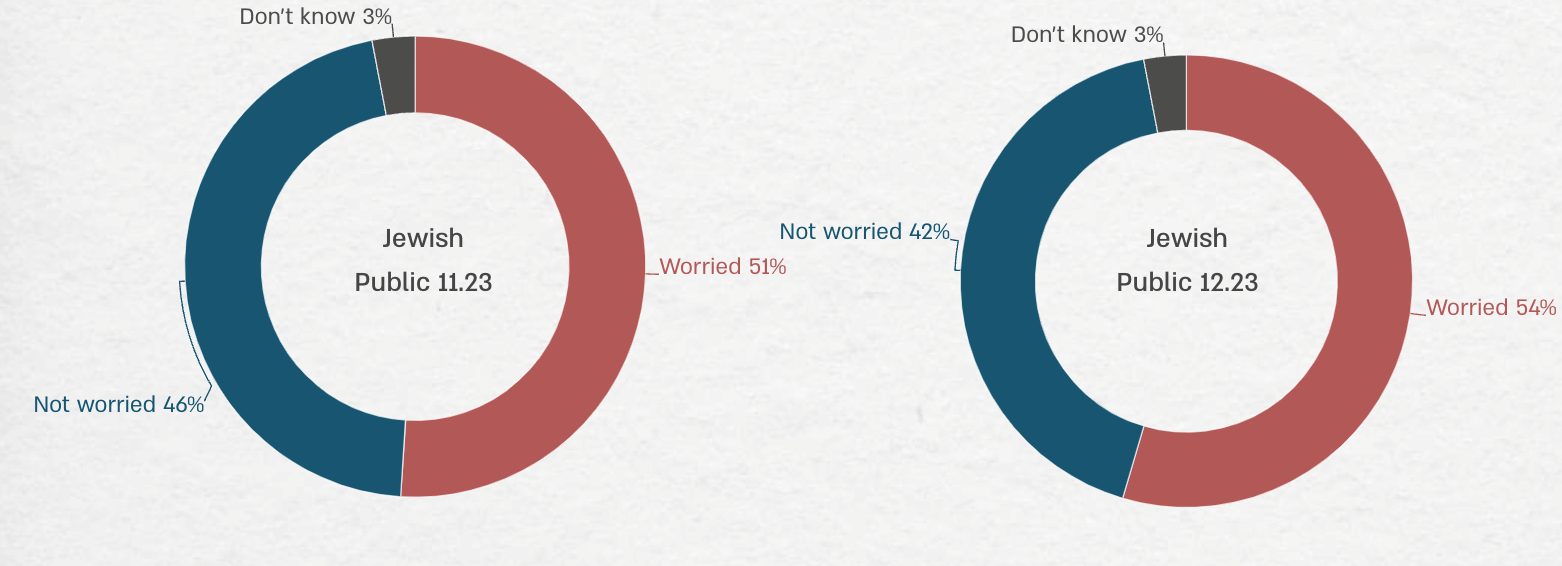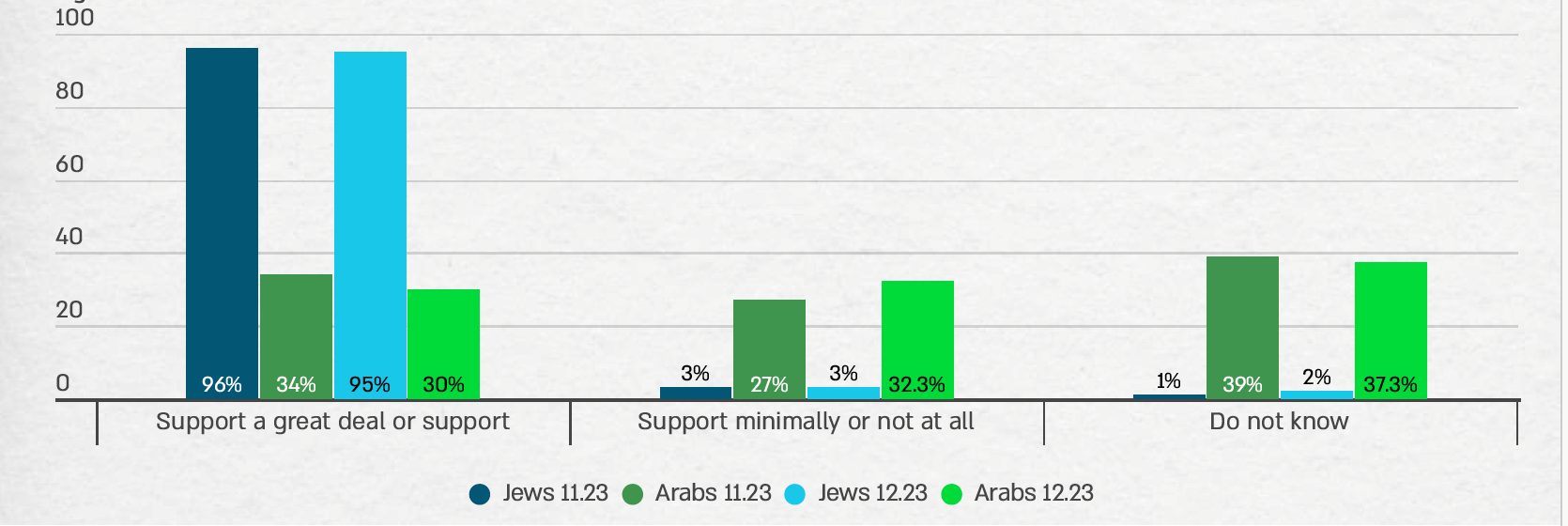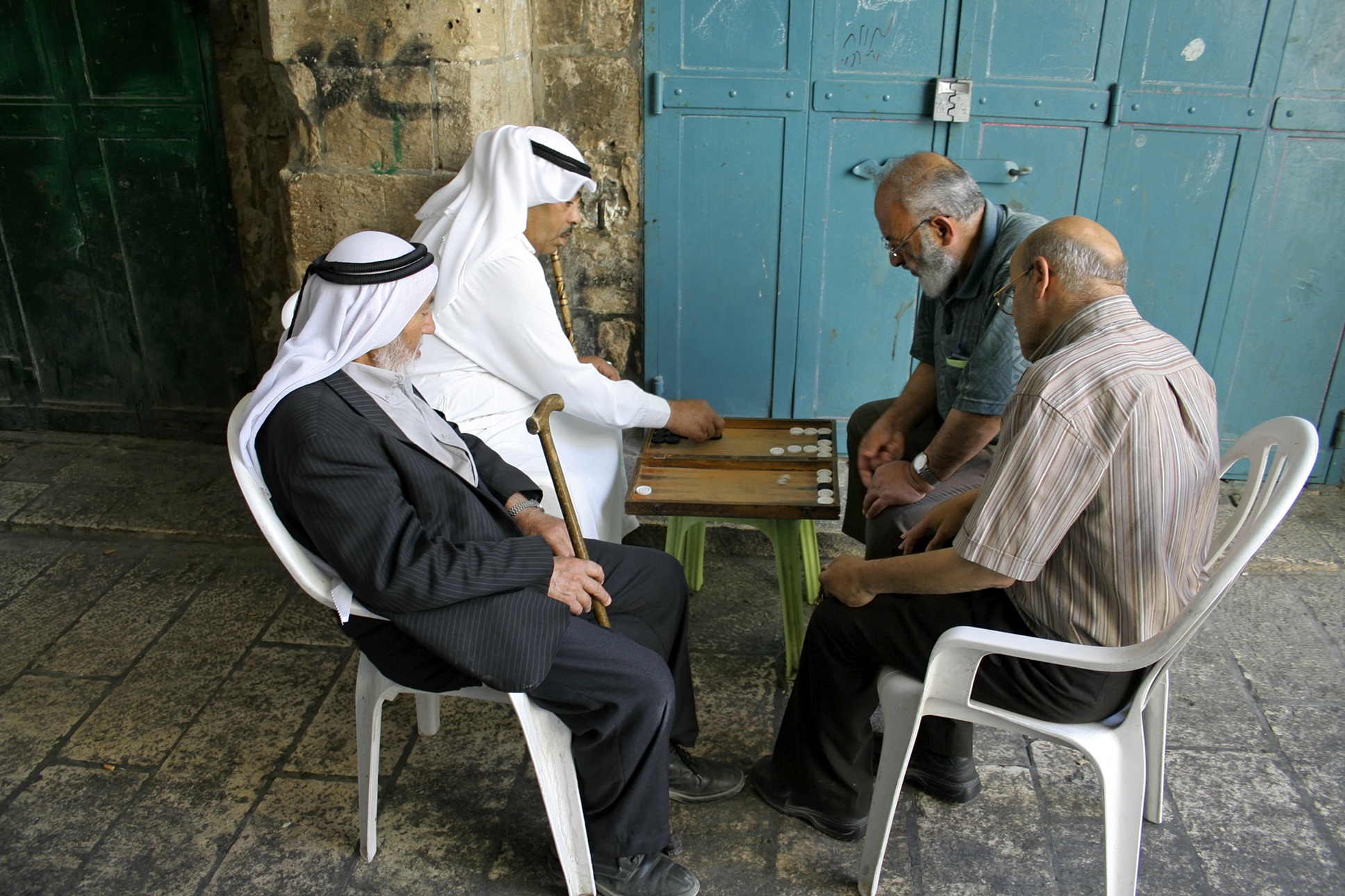Publications
INSS Insight No. 1805, December 31, 2023
One of the encouraging phenomena in Israeli society during the ongoing war in Gaza is the stability and mutual restraint that have so far characterized relations between Jews and Arabs. This is especially noteworthy given the internal tensions inherent in these relations, and given the fierce fighting in the Gaza Strip against Israeli Arabs’ fellow Arabs. The restraint of Arab society lies in the fact that the overwhelming majority see themselves as an integral part of Israeli society and seek to integrate in the country in all areas of life. Israel’s leaders must acknowledge this positive fact, recognize it as a national interest of the highest order, guarantee its enhancement, and firmly block any attempt by radical elements, be they Arab or Jewish, to undermine it. In the immediate term, the country must reinforce the Arabs’ sense of personal safety, including by supplying financial aid to local authorities, businesses, and needy individuals; recoiling from over-zealous application of restrictions on freedom of speech; and heightening the struggle against crime and violence.
Since the Hamas terror attack on October 7, 2023, relations between Jews and Arabs in Israel have remained calm. Thus far, the fears of senior members of the political and security establishments and many others that violent clashes between Arabs and Jews would erupt, as in the events of May 2021, have failed to materialize. Through its leaders, most of the Arab public condemned the terror attack and expressed in words and deeds their shared fate with the Jewish majority. Senior Israeli leaders praised both Arabs and Jews for this stability and restraint, the spirit of volunteering, and maintaining their daily routine during the war. However, in the current volatile situation, there are risks that threaten the sensitive fabric of relations.
What follow is a concise situation picture regarding relations between Israel’s Jewish majority and Arab minority, based on surveys conducted by the Institute for National Security Studies (INSS) and other bodies since the start of the war:[1]
It appears that the mutual fears of violence have declined, even if discernible on the ground, mainly among Jews. In the aChord survey, two weeks after the Hamas attack, some 90 percent of the Jewish public and some 70 percent of the Arab public estimated there would be severe violence between Jews and Arabs within days. This fear proved false. The INSS surveys (November and December) found that 71 percent of the Arabs were not afraid of being attacked by Jews, compared to 51 and 54 percent, respectively, of the Jews who said they feared harassment by Arabs. In other words, more Jews feared attacks by Arabs than the reverse. The Adenauer Program survey showed that almost 60 percent of the Arabs feared harassment by Jews and about 11 percent said that they had actually experienced such harassment.


Identification by Arab citizens with the state and its Jewish citizens has risen presumably by the fact that Arabs were also murdered and kidnapped in the Hamas attack; were killed and wounded by rockets, including Bedouin children; and some saved dozens of Jews. The IDI survey also found that 66 percent of Muslim citizens and 84 percent of Christians and Druze feel part of the state and identify with its problems. The Adenauer survey found that for 54 percent of the Arab citizens, the Palestinian national issue is secondary, relative to the fight against crime and violence, which is the most important issue. This survey also found that 33 percent of the Arab respondents maintain that their Israeli national identity is the most important element of their personal identity, while some 32 percent replied that their Arab national identity is the most important element. In other words, there is an almost equal division between Arabs who put their Israeli national identity first and those who put their Arab national identity first, which involves nationality, culture, tradition, and language.
Identification with the state and support for it in the context of the war against Hamas: both INSS surveys found that 34 percent and 30 percent, respectively, support Israel’s goal to destroy Hamas in Gaza. Although these numbers represent only a third of those questioned, it is a high proportion in itself, in view of the circumstances. When added to the third who responded “don’t know,” the figure perhaps indicates there are some who in fact have an understandable tendency to avoid clear support for the goal, due to the sensitivity of the subject. If so, there are perhaps signs of greater and more unusual support. The Adenauer survey found that some 85 percent had a positive view of the initiatives by Arab citizens to help residents of the Gaza perimeter who suffered in the attack. About 54 percent had a positive view of initiatives by Arab citizens to help Israel’s public diplomacy(“hasbara”) efforts throughout the world.

On the other hand, there are clearly important processes that could affect stability and over time create dangers for the delicate fabric of relations between Arabs and Jews in Israel. Among them:
A renewed rise in serious crime: Crime and violence weaken Arab society, and social and economic weaknesses, together with feelings of fear and frustration, reinforce crime and violence. This vicious circle is a potential threat to national security, and could escalate into violence beyond Arab society. The considerable resources available to criminal organizations represent a real danger, particularly when law enforcement agencies are limited in their ability to deal with the challenge.
This is the main issue that concerns Arab society. After a drop since the outbreak of the war of more than 50 percent in the number of murders, once again there has been a sharp rise, to the highest monthly levels recorded in 2023. For example, the number of Arab murder victims has more than doubled compared to 2022. At this stage there are no signs of a new state strategy or significant steps to limit this serious problem, which leads to frustration in Arab society and a deep sense that the country is not doing enough to combat crime.
Deteriorating economic situation: In both the INSS surveys and the Adenauer survey, about two thirds of Arab respondents reported suffering economic damage since the outbreak of war. An Israeli Central Bureau of Statistics (CBS) survey in October reported that about 30 percent of working Arab men in the 25-64 age group were absent from work for reasons relating to the war. In any possible scenario, the war is likely to have significant and long-term effects on the Israeli economy, and therefore also on the weaker Arab society. Even before the war, compared to the Jewish sector, the Arab sector had higher rates of unemployment, particularly among the younger population. Since the start of the war, the construction industry, which employs many Arabs, has been frozen, with many sites closed due to fears of violence. In addition, most businesses in the Arab sector are small operations and are hard pressed to raise credit from the banking system. They are the first to suffer from a decline in economic activity due to the war and are entitled to very limited assistance from the state. The rise of unemployment and the absence of regular income are expected to create economic problems that could well drive young men to turn to criminal organizations, thus increasing the gray market for loans. All this will strengthen criminal organizations in Arab society.
Greater restrictions on freedom of speech: The INSS surveys show that 57 percent of respondents in November and 67 percent in December believed that on the pretext of war, the state is limiting their freedom of speech. The Adenauer survey found that 50 percent of Arab respondents preferred to refrain from expressing an opinion on the war or from publicly identifying with the suffering of the Palestinians in Gaza, for fear of sanctions.
The right to freedom of expression is a basis of a democratic regime. It is not absolute, certainly not during an emergency, and it can be restricted, for example by banning incitement and encouragement of terror, in order to ensure national security. However, between these restrictions there is a wide range of permissible democratic activity. Restrictions on freedom of speech must be enforced equally, while avoiding over-zealous enforcement, leading to criminal investigations and arrests that could cause more frustration and protests. The enforcement agencies must act responsibly and use professional discretion to examine each case on its merits. Legal assemblies must be permitted, taking account of the state of emergency.
Provocation and harassment by extreme nationalist elements: A large majority of Arab society strongly disagree with extreme ideologies. The unequivocal condemnation of the Hamas attack shows them to be a national minority that is loyal to the state and seeks to integrate in society. However, there are also radical groups that figure more prominently among the young and on social media. As the war continues, there are fears that exceptional events will lead to wide breaches of order. Potential demonstrations could lead to clashes and include the participation of radical elements that seek to promote their ideological agenda, as well as younger people with criminal backgrounds. The state authorities must treat Arab society as a loyal minority and not as a “domestic enemy.” Possible breaches of order require a civilian police response.
In addition, in the current tense atmosphere, elements of the extreme right, with a clear anti-Arab approach, could take the law into their own hands and clash with Arab groups, claiming to be protecting Jews. The extensive distribution of weapons in recent months could feed dangerous violence between Jews and Arabs. The job of the police and other enforcement agencies is to use the law to block extremist groups on both sides and prevent them from being dragged into disturbances.
Policy Recommendations
There is a need to act on several levels simultaneously: to encourage and maintain the welcome stability in Jewish-Arab relations, while also preparing to prevent a possible downward spiral into violence between the two groups.
- In the immediate and medium terms, it is necessary to implement existing five-year plans for Arab society, with the emphasis on financial aid to local authorities, businesses, and needy individuals. The fight against the crime wave must be intensified, and extreme elements on both sides must be restrained.
- The reality of the war should be leveraged to strengthen the link between the state and Arab society. The operations room set up by the Ministry for Social Equality in the Kafr Qassem Municipality, together with the National Committee of Local Authority Heads, to provide information and assistance to local authorities and associations, is a welcome example.
- Looking to the future, the leadership must recognize that the Arabs are a loyal minority and underscore to the Jewish public that the Arabs are a minority who see themselves as part of Israeli society and seek to integrate, and are therefore entitled to equal civil rights.
______________________________
[1] The INSS surveys took place on November 16-19 and December 14-17, 2023. The field work was done by the Rafi Smith Institute and involved internet interviews of 800 men and women constituting a representative sample of the adult Israeli population (age 18 plus). The article also makes use of the following surveys: a survey by the aChord Center at the Hebrew University, conducted on October 18, 2023; a survey by the Adenauer Program at the Moshe Dayan Center in Tel Aviv University, conducted on November 12-16, 2023; and a survey by the Israel Democracy Institute (IDI), conducted on November 5-6, 2023.



